Jerry Lee Lewis |
|
JERRY LEE LEWIS OVERVIEW:
|
|
The wildest and perhaps most talented Nineteen-fifties rocker may have been the mercurial "Killer". Possessed by equal parts fury, talent and ego, Lewis stated his case as an all-time immortal in just over a year of hit-making stardom before scandal derailed his career. In that brief time however he left a veritable crater in the rock landscape. Jerry Lee Lewis was born in Ferriday, Louisiana in 1935 and grew up poor, restless and musically gifted, a trait first seen at the age of eight when he was given the chance for piano lessons. The teacher came by the house on the first day and taught him basic chords, the names of the keys and so forth then gave Jerry a simple tune to learn by the next lesson. When the teacher returned a week later and asked the boy if he had learned the song Jerry nodded and promptly played it flawlessly. The teacher was impressed. Then Jerry said, "But don't you think it'd sound better this way?" and then tore into it in a fashion that left the teacher astounded.
|
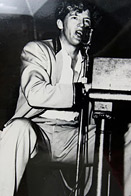
|
|
By 14 Lewis was as proficient on the piano as any adult in the music industry, hastened by his vast exposure to all kinds of music, from the gospel he absorbed in church, the country and pop music heard on the radio, and most importantly the blues and boogie he learned by sneaking into "Haney's Big House", a nearby black club he and cousin Jimmy Swaggart repeatedly snuck into, where liquor flowed, women put out and the music never ceased.
After he'd impregnated and married a teenage sweetheart he entered a Bible College in Texas but quickly managed to get kicked out by "goosing up" the hymn "My God Is Real" on the church piano. He took a job as a vacuum cleaner salesman, failed at it miserably and re-married without bothering to divorce his first wife and was headed nowhere fast in life when in 1956 he read a magazine story on Elvis Presley, now a national sensation, and decided to go to the same studio that had launched Presley's career to try for his own shot at greatness. At the time Lewis was 21, twice married, barely educated, flat broke, totally unknown, quite possibly mentally unhinged, and arguably the best piano player in the world.
|
|
At Sun Records Sam Phillips saw in Lewis the greatest raw talent he'd ever laid eyes on. His abilities on piano spoke for themselves, but it was his intuitive grasp on how to mold a song to suit his own persona, his startling ability to change keys, tempo, even lyrics at the drop of a hat to come up with something entirely new, and the all-out conviction he put into everything he recorded that marked him as special. He had the rare ability, like Presley, to sing anything from standard pop to hillbilly country to storming blues and make it sound wholly original.
|
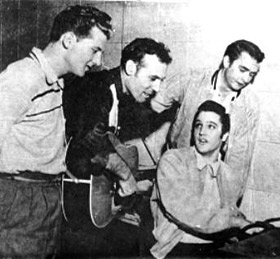
Jerry Lee Lewis, Carl Perkins, Elvis Presley, Johnny Cash
|
|
Above all else it was his utter confidence in his own talents and burning determination to showcase those talents at every opportunity that assured him of lasting notoriety if nothing else. While earning money to buy Christmas presents for his family by playing back-up for Carl Perkins in the studio in December '56, Lewis didn't hesitate to join in the jam-session that occurred when Presley showed up unannounced at the tail end of the night to visit his old stomping grounds. Along with Johnny Cash, who briefly dropped by that evening, the foursome was dubbed "The Million Dollar Quartet". On the surface Jerry Lee seemed unfit to be included under that title, at least at the time, since Lewis was the only one with out a big hit under his belt, Jerry's first record had only just been released that week after all, and yet he refused to be pushed in the background, at one point telling Elvis, who was seated at the piano, to "scoot over, son" so he could play. Upon hearing Jerry on the instrument it was plainly obvious to even Presley that Lewis's talents stood out among them, commenting in awe, "The wrong man's been at the piano 'til now".
|
|
|
Now it seemed all he needed was the right song to get him noticed by the world at large.
"Whole Lotta Shakin Goin On" was already a notorious roadhouse churn and burn song three years old, twice recorded, first by its author, renegade country stomper Roy Hall and more successfully by the great R&B vocalist Big Maybelle. Both had done it somewhat slow and sultry. Jerry reputedly learned it during a stint playing piano in a whorehouse and in his hands the song went from merely suggestive to outright salacious, as he drastically sped up the tempo, pounded the keys with hell-bent fury and imparted the lyrics with a guttural quality obvious enough to make any decent person blush. In doing so Lewis completely re-invented the song to the point where he virtually deserved a writers credit. In the midst of cutting it, having forgotten the original bridge, he simply dropped the tempo and ad-libbed a lewd sounding semi-spoken come-on before storming back for a hellacious finale. In 1957 the song was the very embodiment of rock 'n' roll, past, present and future.
It took awhile to catch on however, as Sun did little to promote it at first, thinking it little more than a B-side to their choice as the more traditional sounding plug-side, "It'll Be Me". But on the road, performing on package tours with Perkins and Cash night after night, Lewis worked up his stage persona, hopping around the piano, arms flailing mightily on the keyboard, burning off his immense reservoir of energy and upstaging everyone in sight. Within a short time a star was born. Seeing the response he got on the road, Sun finally started to push the record, with the sides now reversed, and the reaction was overwhelming. His television debut singing "Shakin" on the Steve Allen Show in July of 1957 was unprecedented in its wildness for the time and a "rock meets TV" benchmark every bit as important as Elvis on The Dorsey Brothers and Milton Berle shows a year before and the Beatles on Ed Sullivan seven years later, while the exposure that appearance garnered further fueled "Shakin's" ascent to the top three on all three music charts - pop, country and R&B.
|
|
The follow-up to "Shakin", a composition from the prolific pen of the great Otis Blackwell, "Great Balls Of Fire" was more calculated in its intent, but equally effective in gaining the desired response from listeners. Still tormented by the conflict between religion and rock 'n' roll, Lewis and Sam Phillips got in a heated argument during the recording session, which was famously captured on tape, over the meaning of the song and Lewis's belief that it represented the embodiment of the devil's music, with Jerry insisting he's bound for enternal damnation by singing it. Of course he sang it anyway and the song promptly soared to the #2 position on the Pop Charts, becoming his biggest hit ever. A few months later another Blackwell-written tune, "Breathless", continued his string of Top Ten hits.
|
|
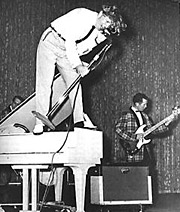
|
|
 |
 |
 |
 |
|
While his recording career was now in full-swing his live performances were already the stuff of legend, as shown famously in March of 1958 when he and Chuck Berry argued backstage over who would close the show at an Alan Freed concert. Lewis was still a relative newcomer but had the bigger hit at the time, while Berry, already a seasoned veteran in his three years in the business, had far more hits to his credit, and thus with Freed's blessing Chuck won the right to go on last. Lewis accepted the decision but was determined to come out on top anyway. He played a ferocious extra-long set and then, closing with "Great Balls Of Fire", doused the piano with gasoline smuggled him by a stagehand, lit a match and sent it up in flames as he banged away on the battered keys like a wildman, the flames rising around him and the smoke curling its way to the rafters while pandemonium broke out in the theater. Walking off stage triumphantly, he said as he passed Berry in the wings, "Follow THAT!". Rock 'n' roll suddenly had a new superstar.
In May of 1958, during another Freed sponsored concert in Boston, Lewis's performance created a full-scale riot, an incident which marked the start of Alan Freed's downfall, as he was charged by Boston Police with numerous crimes in connection to the mayhem and subsequently fired from his radio program in New York as a result of the sensationalistic headlines. The growing unrest surrounding the music late that spring would mark the beginning of the end for rock's first golden age and its next victim would ironically be Lewis himself.
It seemed unlikely, for it was then that his career was at its zenith. With Presley in the Army, Little Richard retired and the rock crown all but his for the taking, Lewis embarked on his first tour of England to solidify his standing among the rock 'n' roll hierarchy worldwide. Instead it was on that tour that Lewis crashed and burned professionally, as word broke of his recent (and already his third) marriage to his 13 year old second cousin, Myra. The tour was canceled in a firestorm of bad publicity and howls of protest from outraged English audiences and upon returning to the States he was immediately blacklisted by radio and television. His latest record, "High School Confidential", from the notorious drugs, sex and violence-themed B-movie of the same name which he had a cameo in, singing the surefire hit from the back of a flatbed truck, his blonde tresses tumbling over his face like a snake-oil salesman pitching rock 'n' roll on the roadside, plummeted off the charts after initially rocketing into the R&B Top Five upon release. From then on he could scarcely give away a record. He went from making $2,000 a night playing to huge crowds to $200 a night playing before half empty seats in dingy clubs. The best songwriters of the day stopped sending material while Sun Records nearly went down in flames with him as they desperately poured all of their energy, time and resources into one poorly planned comeback attempt after another, in the process all but abandoning their other artists who were less than pleased with the label's continuing fixation on reviving Lewis's wrecked career.
|
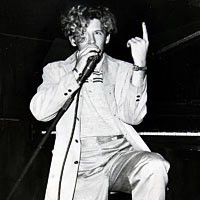 |
|
Lewis and Sun Records weren't the only casualties of the scandal, as rock 'n' roll itself, for years targeted by adult society, saw its own ability to fight off the calls for its banishment severely hampered with someone like Lewis in their midst. The resulting public controversy over him gave the anti-rock 'n' roll legions further impetus for pushing more and more mild, clean-cut and well-behaved teen idols to take the place of the likes of Lewis and his fellow delinquent rockers. Nowhere was this more evident than on the newly instituted national TV show with a societal stamp of approval, "American Bandstand". It had been Lewis who had helped make Dick Clark's venture a smash when he appeared on early telecasts to great ratings, but now the cowardly Clark refused to even return Jerry's calls and adamantly kept him off his show. Elsewhere it was no better for the disgraced singer and it soon became evident that Lewis's career was all but finished.
|
|
|
Through the rest of his tenure at Sun Records ending in 1963 Lewis endured a long commercial dry-spell as such stellar efforts as "Break Up" and "Baby, Baby, Bye Bye" were all but ignored by radio programmers too scared to play him and without the airplay to generate interest the sales dried up completely. A protracted dispute with the musician's union over unpaid dues further hindered his career when it came to live dates.
Three years after his demise, an eternity in music cycles, he finally managed to break through again with a rousing rendition of the Ray Charles hit "What'd I Say" that cracked the Top 30. Eager to capitalize on the renewed interest Lewis embarked on a tour with Jackie Wilson billed as "The Battle Of The Century" and night after night the two dynamic live performers waged war on stages across America. Those who witnessed the shows proclaimed them to be epic in nature, pitting the dazzling showmanship of Wilson, who's incredible multi-octave voice and patented moves often resulted in hysteria from the females in the audience, against Jerry Lee's furious energy and all-out musical passion, with both men pushed to the brink of exhaustion in an effort to upstage one another. Yet as successful as the tour was it somehow failed to translate into sustainted sales interest for Lewis and when his follow-up record, a cover of Chuck Berry's 1958 hit, "Sweet Little Sixteen", barely inched into the Top 100, stalling at a pitiful #95 before dropping off in less than a month, it became evident that the damage to Lewis's career was permanent when it came to mainstream acceptance. Rock 'n' roll itself may have regained its own footing by the early 60's, but after fighting tooth and nail for years over its very existence society was not going to allow the most notorious hell-bent rocker there was to be given a second chance on the American airwaves if they could help it.
|
|
By the mid-60's however Lewis was surprisingly welcomed back with open arms in England, the very place of his demise, where his records had rebounded in sales somewhat after the initial outcry in '58, and it was there that he began to state his case for musical reconsideration. His tours of Great Britain were now met with overwhelming acclaim and two now-immortal live albums from this time document his greatness was still wholly intact, maybe better than ever, but few people in America were buying them to find out. Changing labels did little to boost sales until finally by the late 60's he changed his focus to country music and mounted an astonishing commercial comeback in that field. The notoriously loyal country audience kept him going for over a decade, as he wracked up hit after hit on the country charts, even as he flirted with rock comebacks in the early 70's including one night where he easily upstaged John Lennon and a host of other legends at the Toronto Rock Festival. A short time later he released an album backed by such stalwarts as Alvin Lee that became the highest charting LP of his career to that point.
|
|
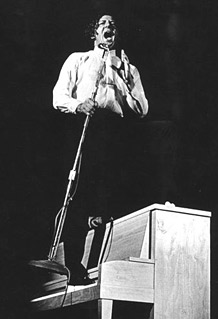
|
|
|
Though he'd never regain the mainstream rock success he'd enjoyed all too briefly in the 50's, he passed into icon status by the 80's and saw his stature continue to climb as the years went by. In 1989 a movie based on his life was made starring Dennis Quaid and Wynona Ryder as Jerry and Myra, and the film's soundtrack, featuring Lewis performing new storming renditions of his classic hits, sold better than any of the albums from his original heyday. At the concert for the Rock 'n' Roll Hall Of Fame & Museum's grand opening in Cleveland, Ohio in 1995 Lewis provided the first highlight of the 8 hour star-studded concert when, backed by Bruce Springsteen & The E-Street Band, he delivered a hellacious rendition of "Whole Lotta Shakin' Goin On" that proved his legendary performing skills were still intact. Finally in 2006 he confirmed his place in rock history with a lauded "comeback" album, "Last Man Standing", featuring a parade of high profile guest stars whom he promptly put to shame with his still-amazing skills and intensity. It garnered him perhaps the best reviews he'd ever enjoyed and showed that, even in his 70's, nobody outrocked the Killer.
|
His personal life more than matched his up and down career. Married seven times, suffering through the drowning death of his baby son in the early 60's, boozing at every turn, arrested more than once, including for a drunken confrontation at Graceland where he reputedly threatened to shoot his old friend and advisary Elvis Presley, and wracked with a series of illnesses that hounded him but could never collect, he has miraculously outlived and outplayed most of his contemporaries and still pounds the piano better than anyone alive. Despite having just three major rock hits in his entire career he was among the inaugural class of inductees to the Rock 'n' Roll Hall Of Fame and to this day stories of his wildness, his immense talent and his monstrous ego are widely told throughout the industry, leaving the listeners shaking their heads in disbelief at the notorious legend of "The Killer".
|
|
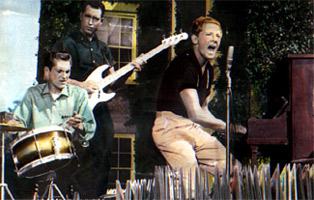
|
|
|
|
ESSENTIAL RECORDINGS:
|
|
Lewis's career has been exhaustively annotated on three enormous boxed sets from Bear Family which contain virtually everything he ever recorded through the end of the seventies, including hundreds of outtakes, undubbed and alternate versions which are often-times even more revealing than the released records. In chronological order, they are:
CLASSIC: THE COMPLETE SUN RECORDINGS (Bear Family)
First, and most crucial, in these sets contains everything he ever recorded at Sun Records, all of the hits, alternate takes of virtually every song, with all of the false starts, aimless jams and the famed argument with Sam Phillips over playing the devil's music, rounding out the proceedings. It is as good a look into the inner-workings of a famous studio and legendary performer as can be found. Musically speaking, the previously unreleased cuts are astonishing to hear and will more than justify Lewis's vaunted reputation, something evident on the very first session when he ran through songs of every style and source, all with supreme confidence and total originality. The dynamic playing of his studio cohorts, Roland Janes on guitar and JM Van Eaton on drums, stand out no matter how varied the material was, and together with Lewis on piano they make a convincing case that they were the original power trio in rock. Eight CD's and not a bad performance to be found.
THE LOCUST YEARS & AND THE RETURN TO THE PROMISED LAND (Bear Family)
In 1964 Lewis left Sun and signed with Mercury Records Smash subsidiary and began to climb out of the rubble. Their initial plan for him was to ressurect his status as a rock icon, yet as was happening to other 50's rock stars at this time he was frequently being asked to re-record his old hits, which neither offered anything new to curious audiences or filled a commercial void. Once he was allowed to cut new material the sessions recaptured much of the flair of his immortal Sun years, with such storming performances as "I'm On Fire", which nevertheless barely cracked the Top 100. With the commercial failure most of these received there came about a gradual shift to country music, culminating with "Another Place, Another Time" that saw Lewis finally break through the prolonged commercial draught he'd endured. While the ensuing songs barely scaled the Pop Charts, they soared up the country charts and established him as a star in that field as well. The latter half of the box finds him cutting exceptional country songs and scoring numerous hits like "What's Made Milwaukee Famous (Made A Loser Out of Me)" and "She Still Comes Around (To Love What's Left Of Me)" that have taken their place alongside his biggest rock hits as the cream of Lewis's output in his long career. Perhaps the most varied collection of music that Lewis ever cut took place during this era.
MERCURY SMASHES AND ROCKIN' SESSIONS (Bear Family)
The third and last of the Bear Family boxed sets covers Lewis when he had largely crested both on the pop charts as a rocker and on the country charts, yet this still finds him in excellent form throughout, regardless of which style he's playing. His gospel work from these years provides a startling glimpse into the religious background that constantly pulled at him as well, and which never was allowed to really surface on record before this. His brief early 70's rock resurgance with the hits "Me & Bobby McGee" and "Chantilly Lace" show that his ability to shape familiar songs into his own remained wholly intact, while there are a surprising number of later year songs that he's remained identified with ever since, such as the notoriously lewd "Meat Man". At ten discs, for an era in which he had the least amount of commercial success, this might seem like overkill, but it reveals Lewis's genius in ways that even his hits only hinted at.
|
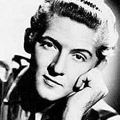
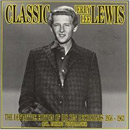
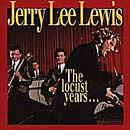
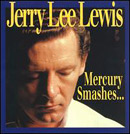
|
|
OTHER NOTABLE COLLECTIONS & ALBUMS:
|
|
A HALF CENTURY OF HITS - (Time-Life)
|

|
If the mega-boxes are too extravagant for all but the most devoted listener, this recent box set provides a more reasonably priced one-stop shopping for all stages of Lewis's career. Three discs spanning the recently unearthed first recordings Jerry Lee made in 1952, while still a teenager, and covering all of the major recordings of his Sun, Smash and Mercury years, along with otherwise hard to find 80's recordings for Elektra and into the 90's. It's missing a few songs that are inexcusable, and its not strictly chronologically sequenced, but for those who haven't heard the Bear Family Boxes to realize just how much unknown material is essential, but who want more than just a bare bones collection, this is fairly easy to find in stores and will be the way to go for many.
|
|
UP THROUGH THE YEARS 1956-1963 - (Bear Family)
|
 |
Done by Bear Family as sort of a sampler from their Classic Boxed Set it has virtually all of the high points he recorded during his most fertile stretch as an artist along with some excellent cuts on the obscure side. A few essentials are missing ("High School Confidential" being most prominent), keeping this from being the must-have disc to start out with, but overall this digs deeper than the far bigger selling "18 Original Sun Hits" that remains his best selling collection.
|
|
25 ALL-TIME GREATEST SUN RECORDINGS
|
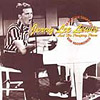 |
The best single disc hits collection of his glory days. All of the expected songs are present along with some of the more recognizable cuts that never charted. "Wild One" is the most conspicuous and unforgivable absence, a misstep that keeps it from being truly definitive, but otherwise this is easy to find and the most complete look at his legendary recordings in one place.
|
|
THE COMPLETE MILLION DOLLAR QUARTET - (Sony BMG)
|
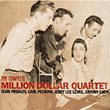 |
Fifty years after the momentous occasion the full unedited December 1956 session was finally released in their original running order, as Elvis Presley, Carl Perkins and Jerry Lee Lewis, with Johnny Cash briefly stopping in, have an extended informal jam-session as they casually tackle songs from all areas of music. Though his own debut had just come out that week, Lewis refuses to be left in the background, brazenly asserting himself into the forefront until by the end he is center stage putting on a full scale show for Presley. A remarkable historic document wherein Jerry's brash personality is evident throughout.
|
|
LIVE AT THE STAR CLUB
|
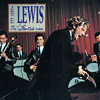 |
Consistantly voted one of the top ten live rock albums ever, this brings a 29 year old Lewis to Europe and sets him loose. It has been called the original punk rock document and remains the best evidence on record as to Lewis's vaunted on-stage reputation. Absolutely incendiary.
|
|
THE GREATEST LIVE SHOWS ON EARTH
|
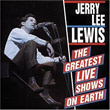 |
Bear Family combined the original "Greatest Live Show On Earth", cut in 1964 in Alabama, with another live performance from that same time to come up with an extended look at Lewis's still scalding hot live gigs. His mid-60's hit "Hi-Heeled Sneakers" came out of these sets and they are nearly as revealing as the more famed Star Club set.
|
|
THE SESSION
|
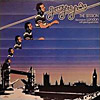 |
Recorded in London with Alvin Lee, Peter Frampton, Rory Gallagher and others, this was jumping on a trend started by the Chess Records label of blues (Howlin' Wolf, Muddy Waters) and rock (Chuck Berry) legends, which helped raise their profile again with modern audiences. Contrived though it may be, it worked for Lewis as well, giving him his first Top 40 Album of his career. Certainly not the place to start, but it is worth getting to round out a collection.
|
|
GREAT BALLS OF FIRE: ORIGINAL MOTION PICTURE SOUNDTRACK
|
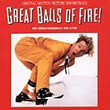 |
Cut for 1989's bio-pic by the same name, this features blazing new renditions of his old hits made to sound vintage and surprisingly they match the intensity of the originals and are excellent all around. A highlight is a stirring version of "That Lucky Old Sun" that stands with almost anything he's ever done and for that alone makes the entire album worth getting.
|
|
LAST MAN STANDING
|

|
The well-received 2006 comeback album featuring Jerry cutting tracks with a host of legends, a concept that has disaster written all over it, yet amazingly it surpasses even the most fervent Lewis fan's hopes. His playing throughout is phenomonal, the songs are as diverse as he is, and even if the obvious across the board guest stars covering every niche and genre out there in an attempt to stir interest in fans from all areas of music is blatant and downright shameful on the surface, the results are astounding nevertheless. Even the notes from Peter Gurlanick are entertaining in their own right. As for the music itself, Led Zeppelin's "Rock & Roll" sounds as if it was written for Lewis to begin with, and The Killer turns in one of his best ever performances on "Hadacol Boogie" with fiery guitar playing by Buddy Guy. More than fifty years after walking off the streets into Sun Records it became Lewis's highest charted album ever in a career that doesn't seem quite done just yet.
|
|
|
QUOTES ABOUT JERRY LEE LEWIS: |
|
"Don't ever call me a hillbilly, I'm a ROCKER!" - Jerry Lee Lewis, leaving no doubt as to his true musical allegiance.
"People are always trying to compare musicians but I can't find ANYONE to compare with Jerry. What you hear him doing on records is only a small percentage of what he's capable of doing. I don't think even he knows how great he is. He can take a solo with either hand and sing a song five different ways, every one of them great. I remember when he worked the package shows, Jerry would sit backstage after the show at the piano and all the big stars would gather around him and watch. Chuck Berry, Buddy Holly, The Everly Brothers and so on. Jerry would be leading the chorus and everyone would be having a ball." - Roland Janes, guitarist at Sun Records.
"I swear he was playing piano with his right hand and drums with his left!" - Jack Clement, producer at Sun Records on hearing Lewis on the piano at his first session.
"He turned the piano into an orchestra. He had these profound bass lines and amazing lead parts, all in perfect time... pure narcotic rock 'n' roll excitement." - Moby.
"Jerry Lee Lewis is just the greatest rock 'n' roller ever" - Ronnie Hawkins, 50's rocker.
"He's one of few who can do rock 'n' roll, country or soul, and every song is authentic. He's one of the best American voices ever, and I'm not sure people recognize what a great singer he is. It was always his rambunctious activities that made the headlines." – Kris Kristofferson.
"Like the recordings of Hank Williams, Louis Armstrong and few others, Jerry Lee's early recorded work is one of the most amazing collections of American music in existence." - Cub Koda, guitarist for Brownsville Station and editor at All Music Guide.
"Jerry has just stuck right to the heart of the music" - Chuck Berry.
"To this day, Jerry Lee Lewis gives off more energy than a nuclear reactor, and he's just as volatile." – Rhapsody website
"The ultimate rock 'n' roll rebel" - Rock & Roll Hall Of Fame bio.
"With Jerry, there was a genuine feeling of danger, and that was part of the excitement" - Robbie Robertson (The Band).
"You talk about a talent! Good God Almighty! I'm not talking about voice, piano, any ONE thing. He's one of the great talents of all time in ANY category!" - Sam Phillips, Sun Records founder and Lewis's first producer.
"Jerry Lee Lewis was fantastic!" - Little Richard, regarding his prime 1950's rival for most outrageous piano pounder in rock 'n' roll.
"Jerry Lee Lewis did everything but fuck the piano. He was jumping on it, kicking it. The piano is an inanimate object of a huge weight (but he) made the instrument exciting." - Elton John
"When he's on stage he just rocks and that's the essence of him" - Ron Wood (The Rolling Stones)
"Elvis Presley, Jerry Lee Lewis and Little Richard were my three biggest influences. I liked that they were so out there, so crazy. That appealed to me. I'll never forget when I saw Jerry Lee the first time on television. He was playing along and I'm thinking this is cool and then all of a sudden he jumps up and kicks his chair backwards, and I thought 'This is it. This it what it's all about!'." - Jerry Roslie, lead singer of the the original punk rock band The Sonics, on Lewis's impact on the burgeoning spirit of punk.
"Jerry Lee Lewis is an American original" - Johnny Cash.
"Rock 'n' roll is the music that inspired me to play. There is nothing conceptually better than rock 'n' roll. No group, be it the Beatles, Dylan or The Stones, have ever improved on 'Whole Lotta Shakin' Goin' On' for my money" - John Lennon
"The way that boy plays piano just goes right through me" - Elvis Presley, upon hearing a still unknown Lewis at Sun studio, December 1956.
"That ought to be a union test for a rock 'n' roll piano player. You think you're hot? Okay, play this!" - unnamed backing singer on Lewis's skill as a pianist.
"Elvis is the greatest, but I'm the best." - Jerry Lee Lewis
"There's only one Jerry Lee Lewis!" - Roy Orbison
"If I'm goin' to Hell, I'm goin' playing the piano!" - Jerry Lee Lewis on recording the Devil's music, rock 'n' roll.
|
|
RECOMMENDED READING: |
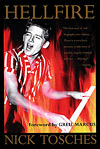
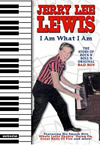
|
|
Great Balls Of Fire
- Myra Gale Lewis & Murray Silver
Hellfire
- Nick Tosches
|
|
RECOMMENDED VIEWING:
|
|
Jerry Lee Lewis: I Am What I Am
|
|
JERRY LEE LEWIS RECORDINGS:
|
|
Greatest Rock Recordings:
1. Whole Lotta Shakin' Goin' On
2. Great Balls Of Fire
3. Breathless
4. High School Confidential
5. What'd I Say
6. Break Up
7. Crazy Arms
8. Wild One (Real Wild Child)
9. Mean Woman Blues
10. Lewis Boogie
11. I'm On Fire
12. Down The Line
13. End Of The Road
14. It'll Be Me
15. Drinkin' Wine Spo-Dee-O-Dee
16. Sweet Little Sixteen
17. Hi-Heeled Sneakers
18. Bonnie B.
19. Matchbox
20. Baby Baby, Bye Bye
21. Money (That's What I Want)
22. Big Legged Woman
23. Let The Good Times Roll
24. Rockin' My Life Away
25. When The Saints Go Marchin' In
|
|
Greatest Country Recordings:
1. Another Place, Another Time
2. What's Made Milwaukee Famous (Has Made A Loser Out Of Me)
3. There Must Be More To Love Than This
4. Me & Bobby McGee
5. Would You Take Another Chance On Me
6. She Still Comes Around To Love What's Left Of Me
7. One Minute Past Eternity
8. Green, Green Grass Of Home
9. One Has My Name (The Other Has My Heart)
10. 39 And Holding
11. Chantilly Lace
12. She Even Woke Me Up To Say Goodbye
13. In Loving Memories
14. You Win Again
15. Invitation To Your Party
16. Sometimes A Memory Ain't Enough
17. Middle Age Crazy
18. I'll Find It Where I Can
19. Who's Gonna Play This Old Piano
20. He Can't Fill My Shoes
21. I Can't Seem To Say Goodbye
22. Touching Home
23. Think About It Darlin'
24. I'll Make It All Up To You
25. Once More With Feeling
|
|
|
PLACEMENT ON DDD LISTS (as of April, 2015): |
|
Greatest Rock Pianists - # 1
Greatest Frontmen of Rock - # 8
Greatest Rock 'n' Roll Artists of the 50s - # 14
Greatest 'Live' Artists - # 25
Greatest Rock Artists - # 59
Greatest Rock Songs - #35. Whole Lotta Shakin' Goin' On, #51. Great Balls Of Fire,
|
|
